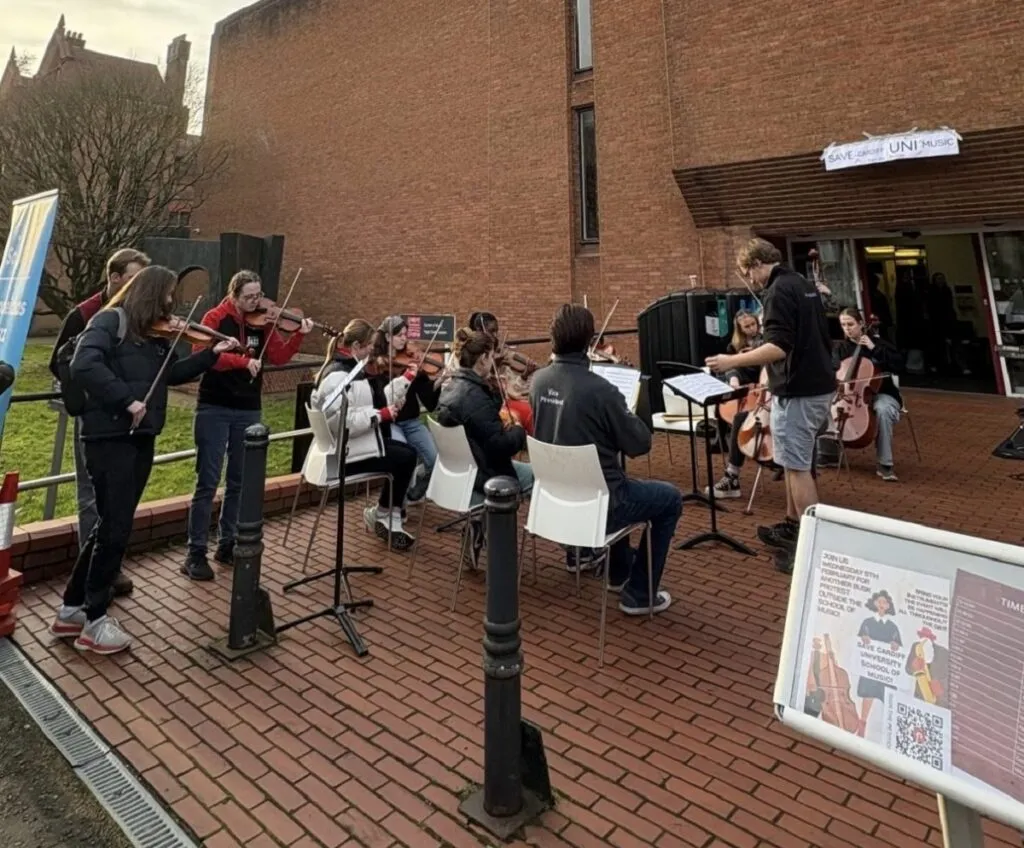

Harry Styles, Elton John, and Ed Sheeran team up to SAVE Cardiff University’s school of music from closure
In a striking plea that has reverberated across the world of arts, culture, and education, global music icons such as Sir Elton John, Ed Sheeran, Harry Styles, and Stormzy have stepped forward to oppose the proposed closure of Cardiff University’s prestigious School of Music. The university, which boasts a global reputation for excellence in music education, faces this drastic measure as part of a broader plan to cut costs and address a significant financial deficit of over £31 million.
The proposed closure has sparked widespread outrage, with musicians, educators, and the broader public urging the UK government to intervene. This article explores the broader implications of the closure, the unified call to save the music school, and the vital importance of investing in arts education to ensure a thriving and diverse cultural landscape for future generations.
The Legacy of Cardiff University’s School of Music
Founded as a beacon of musical excellence, Cardiff University’s School of Music has played a central role in nurturing some of the finest musicians, composers, and music scholars in the UK. With its internationally respected faculty, cutting-edge research, and strong emphasis on practical and theoretical training, the school has been a hub of innovation and creativity.
Generations of students have passed through its halls, going on to make significant contributions to the world of music. From classical orchestras and opera companies to contemporary music production, Cardiff’s alumni have left their mark on every corner of the musical world. Closing the department would mean the loss of a crucial training ground for future talent and could severely impact the cultural ecosystem of Wales and the UK at large.

A Star-Studded Plea: Musicians Speak Out
Recognizing the far-reaching consequences of the proposed cuts, some of the world’s most prominent artists have banded together to voice their opposition. The charge is led by Ed Sheeran, who has written an open letter to Prime Minister Keir Starmer, calling for immediate action to prevent the closure. The letter has been signed by a stellar lineup of artists, including Sir Elton John, Harry Styles, Stormzy, and many others.
The letter is more than just a plea to save Cardiff University’s School of Music—it is a call for a broader investment in music education across the UK. The artists demand a £250 million government commitment to support music education, which would fund 1,000 new music teachers, grassroots music venues, apprenticeships, and a diverse curriculum designed to nurture talent from all backgrounds.
Why Music Education Matters
At the heart of the debate lies a fundamental question: Why does music education matter? For many, the answer is clear. Music is not just an art form—it is a vital part of the UK’s cultural heritage and an essential pillar of its economy.
The UK music industry contributes billions of pounds to the national economy each year and has a global reputation for producing world-class talent. From The Beatles and David Bowie to Adele and Ed Sheeran, British musicians have long been at the forefront of the global music scene. However, sustaining this success requires a continuous pipeline of talent, which is built through access to high-quality music education.
Without adequate funding and resources, the risk is that music will become an increasingly elitist pursuit, accessible only to those who can afford private lessons and expensive instruments. This, in turn, could undermine the diversity and creativity that have been hallmarks of the UK music scene.
A Threat to Diversity and Inclusion
One of the most concerning aspects of the proposed closure is its potential impact on diversity and inclusion within the music industry. Esteemed composer Sir Karl Jenkins has warned that shutting down music departments like Cardiff’s could exacerbate existing inequalities by limiting opportunities for state-educated musicians.
Historically, music education in the UK has been a key pathway for talented young people from diverse backgrounds to achieve success in the industry. By reducing access to music education at the university level, the risk is that future orchestras, bands, and music ensembles will become less representative of the society they serve.
The Broader Impact of Arts Cuts
The closure of Cardiff’s School of Music is not an isolated incident—it is part of a broader trend of cuts to arts and humanities programs at universities across the UK. These cuts are often justified on economic grounds, with university leaders arguing that they need to prioritize subjects with higher earning potential for graduates.
However, critics argue that this narrow focus on economic outcomes ignores the broader value of the arts. Music, theater, literature, and other creative disciplines contribute not just to the economy but also to mental health, social cohesion, and cultural identity. In times of crisis, from the COVID-19 pandemic to economic downturns, the arts have played a crucial role in helping people cope, connect, and heal.
Community and Academic Response
The proposed closure has prompted an outpouring of support for the School of Music from students, alumni, and the broader academic community. Petitions have been launched, protest marches organized, and open letters written, all calling on Cardiff University to reconsider its decision.
The Royal Musical Association has issued a statement expressing shock and dismay at the announcement, emphasizing the school’s prestigious history and its role in advancing musical scholarship. Meanwhile, the Welsh Music Guild has urged university leaders to engage in meaningful dialogue with stakeholders to explore alternative solutions.
Government’s Role in Protecting Music Education
As the debate over the future of Cardiff’s School of Music continues, attention is increasingly turning to the UK government and its role in supporting music education. The collective call from Ed Sheeran, Elton John, and others underscores the need for a coordinated national strategy to protect and promote the arts.
While the government has announced plans to establish a National Centre for Arts and Music Education and has pledged to support grassroots music venues, critics argue that these measures do not go far enough. What is needed, they say, is sustained investment at every level of the education system, from primary schools to universities.

A Path Forward
As discussions continue, there is hope that a compromise can be reached that will allow Cardiff’s School of Music to continue its vital work. This could involve finding alternative sources of funding, restructuring the department to reduce costs, or forging partnerships with other institutions and organizations.
Whatever the solution, it is clear that preserving access to high-quality music education must be a priority. The stakes are too high to do otherwise.
Conclusion: A Call to Action
The proposed closure of Cardiff University’s School of Music is a stark reminder of the challenges facing arts education in the UK. However, it has also sparked a powerful and unified response from artists, educators, and the community, all determined to protect the future of music education.
As the campaign to save Cardiff’s School of Music gathers momentum, it serves as a testament to the enduring power of music to inspire, connect, and bring people together. By investing in music education today, we can ensure that future generations have the opportunity to experience the joy, beauty, and transformative power of music.


















